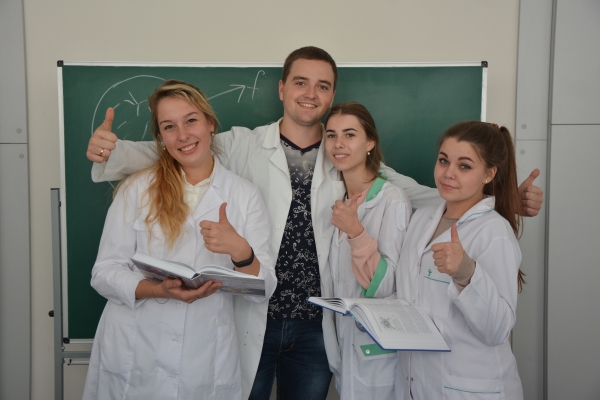Address: Mala Shyianovska (Nemyrovycha-Danchenka) Street, 2, Kyiv 01011, Ukraine
Rooms: 1-0214, 1-0208
Tel: +38044-256-21-65, +38093-652-60-77
e-mail:
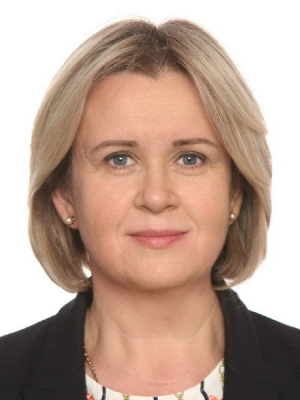
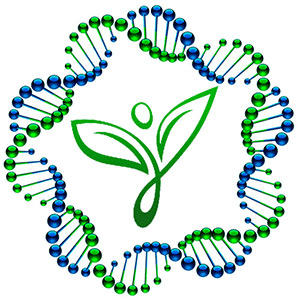
Mission: Study, apply, act!
90 YEARS OF EXPERIENCE!
The Department of Biotechnology, Leather and Fur is the biggest department in Ukraine that trains highly qualified professionals for leather production and biotechnology.
Today, the Department is presented as a modern scientific training unit with a strong research base and student-oriented educational process.
The main goal is to train highly qualified professionals with creative thinking for the development of new materials and technologies.
Kyiv National University of Technologies and Design offers bachelor’s and master’s degree programs.
Genuine leather is one of the most durable materials. Thanks to modern technology, leather production is becoming more eco-friendly. This technology can reduce the impact on water resources and play a role in sustainable development. The use of tannery equipment makes it possible to quickly change a range of leather products according to fashion trends. The graduates show in-depth knowledge in leather technology and technological equipment, have hands-on experience in leather expertise and process control and improve design and process management.
We also invite you to plunge into the world of biotechnology. Doing a bachelor’s and master's course, you will study a wide range of biological and chemical subjects such as cell biology, genetics, organic chemistry, molecular biology, modern biotechnology, etc.
Getting a hands-on lab experience is one of the most important parts of our educational process, and we are greatly interested in the development of our students’ research-oriented thinking. International collaboration, research activities, and profound knowledge are keys to your career development.
Members of the Department of Biotechnology, Leather and Fur:
|
Dr. Sc., Professor, Head of the Department of Biotechnology, Leather and Fur Winner of the State Prize of Ukraine in Science and Technology, 2013 |
|
Dr. Sc., Professor of the Department of Biotechnology, Leather and Fur |
|
Dr. Sc., Professor of the Department of Biotechnology, Leather and Fur |
|
Dr. Sc., Professor of the Department of Biotechnology, Leather and Fur Winner of the State Prize of Ukraine in Science and Technology, 2013 |
|
Ph.D., Associate Professor, Department of Biotechnology, Leather and Fur |
|
Ph.D., Associate Professor, the Department of Biotechnology, Leather and Fur |
|
Ph.D., Associate Professor, the Department of Biotechnology, Leather and Fur |
|
Ph.D., Associate Professor, the Department of Biotechnology, Leather and Fur |
|
Ph.D., Associate Professor, the Department of Biotechnology, Leather and Fur |
|
Ph.D., Associate Professor, the Department of Biotechnology, Leather and Fur |
|
Ph.D., Associate Professor, the Department of Biotechnology, Leather and Fur |
|
OLEKSANDR KALINICHENKO Assistant, the Department of Biotechnology, Leather and Fur |
The research infrastructure of the department includes two scientific training laboratories (STL):
The equipment of the STL “Advanced Biomaterials and Technology”: complex equipment for the development of production and characterization of biotechnological products of different origins according to their structure and functions; complex of analytical manipulations with protein and peptide molecules (electrophoretic, functional analysis using modern equipment for electrophoresis, equipment that analyzes optical density, specific parameters of protein interactions); a set of equipment for the study of molecular properties (PCR) and the microbiological component and specificity of the studied objects; necessary technical support, provided with computer and multimedia equipment, application programs. The condition of the rooms is certified by sanitary-technical passports that meet the current regulations.
The STL “Examination of Leather and Fur” includes laboratories for analytical research, determination of physical and mechanical parameters of genuine leather, testing of the technology in experimental conditions.
Examination of leather and fur involves the analysis of their chemical composition: the content of total nitrogen, tannins, substances extracted with organic solvents, and many other analyses.
In addition, an expert assessment involves the study of the physicomechanical and hygienic properties of leather and fur, quality of leather finishing, the resistance of leather soles to abrasion, and structural features of leather.


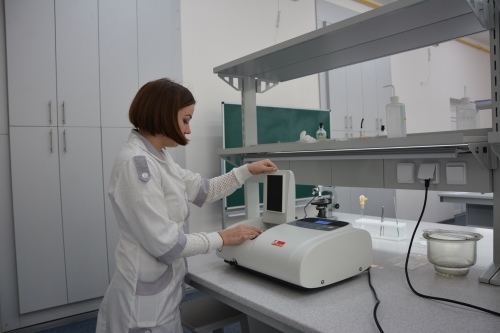

Research work is performed by the scientific direction “Integrated processing of raw materials, recovery and disposal of biotechnological production waste.”
Directions of scientific work of the Department:
STL “Advanced Biomaterials and Technology”
1. Development and implementation of complex preparations of combined action based on collagen derivatives or biocompatible polymers for the treatment of wound surfaces.
2. Molecular biological approaches for the development of new biosafe means and drugs for anti-infective protection using modern nanobiotechnology.
3. Development of biosensor technology for environmental biotesting.
4. Development of microbial technology for bioremediation.
5. Research of biofilms formation and anticorrosive-antifouling agents’ development.
STL “Examination of Leather and Fur”
1. Physical-and-chemical principles of biopolymers modification in leather and fur production.
2. Development of resource-saving technology for leather and fur production to create competitive products.
3. Development of low-waste environmentally friendly technology for the production of leather and fur.
4. Scientific principles of materials development and improvement of leather and fur finishing processes.
5. Physical-and-chemical principles of purposeful formation of structure and operational properties of leather and fur materials.
6. Analytical quality control of chemical materials for leather and fur production.
7. Identification examination of leather, fur, and other products.
8. Quality and conformity assessment of leather and fur materials and other products.
In 2021, the research work “Study of physiological and biochemical characteristics and biofilm formation of bacteria isolated from vascular plants of Antarctica” was launched together with the National Antarctic Research Center of the Ministry of Education and Science of Ukraine.
On August 23, 2014, President of Ukraine Petro Poroshenko signed a decree on awarding the State Prize in Science and Technology of 2013. The work “Polyfunctional leather and fur materials” by the authors from the Department of Biotechnology, Leather and Fur received this prize.
In 2019, the President of Ukraine Award for Young Scientists was awarded to Ph.D. Olga Shydlovska as part of a team of scientists for the research work “Features of the reproduction of herpes viruses in conditions of mixed infection and the development of promising antiviral agents.”

Researchers of the Department take an active part in annual conferences of Ukraine, Poland, Lithuania, Turkey, Slovakia, China, Estonia, Canada, Latvia, Belgium, Britain, Germany, Switzerland, the Netherlands, Romania, and others.
Throughout 2017-2019, the researchers of the Department participated in Erasmus Project KA107 – “Higher education student and staff mobility between the Programme and Partner Countries” under the Program of the European Union Erasmus+ jointly with Prof. Geert Potters (Antwerpen Maritime Academy, Belgium).
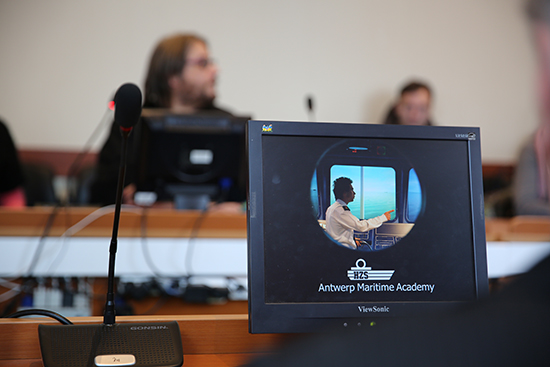
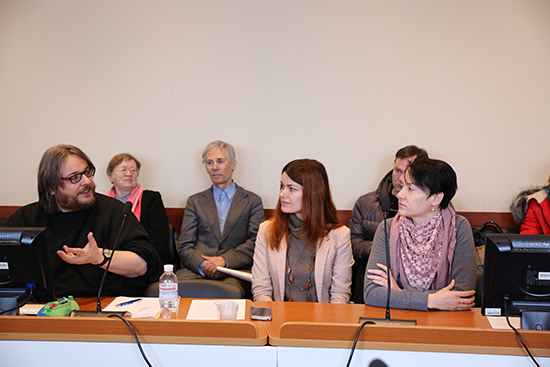
In 2020, Ph.D. Iryna Voloshina and Ph.D. Olga Shydlovska completed an internship at the Faculty of Natural Sciences of Vytautas Magnus University (Kaunas, Lithuania).
In 2019, with the support of KNUTD, Kyiv Institute was established at the Qilu University of Technology (Jinan City, Shandong Province, People’s Republic of China). Sino-Ukrainian educational institution trains specialists in the educational programs “Chemical Technology and Engineering” and “Biotechnology”. The teaching of specific subjects is provided by the academic staff of the Department of Biotechnology, Leather and Fur.
Educational and methodological support includes the programs of courses taught at the Department, textbooks and manuals, lecture notes and methodological materials for laboratory work, independent problem solving, processing the results of laboratory work, electronic versions of the mentioned manuals and methodical materials posted on the site, specifically on the page of the Institute of Distance Education. The guidelines are constantly updated to reflect new teaching trends.
Higher Education Level – First (Bachelor)
Higher Education Degree – Bachelor
Specialty – G21 Biotechnology and Bioengineering
Educational program – «Biotechnology»
Bachelor’s Degree, single, 240 ECTS credits, duration of training – 3 years and 10 months
Bachelor’s Degree, single, 180 ECTS credits, duration of training – 2 years and 10 months
Prerequisites: complete general secondary education, professional higher education, or junior bachelor’s degree (junior specialist). By the Standard of Higher Education in the specialty based on the degree of junior bachelor (OQR junior specialist), the University nostrifies ECTS credits received within the previous educational program for junior bachelor (junior specialist)
The bachelor’s degree program focuses on training professionals who can use biological agents and their products at the professional level to obtain biologically active substances and products through biosynthesis and/or biotransformation, considering the bioethics and biosafety of society.
Emphasis is placed on the formation and development of professional competencies to solve applied problems in the field of biotechnology and bioengineering through research, development, creation, and production of biotechnological products for medicine, health, agriculture, ecology, energy, light industry, and more.
The program provides in-depth theoretical and practical training, generalization of the results of project-technological and industry-technological solutions, scientific-research work, implementation, and defense of a qualifying scientific paper. The program develops employment prospects in modern biotechnological enterprises. It provides opportunities for the implementation of international academic mobility of the educational process participants.
Higher Education Level – second (Master’s degree)
Higher Education Degree – Master
Specialty – G1 Biotechnology and Bioengineering
Educational program – «Biotechnology of high molecular weight compounds»
Master’s degree, single, 90 ECTS credits, duration of training – 1 year and 4 months
Prerequisite: Bachelor’s degree
Master’s degree, single, 90 ECTS credits, duration of training - 1 year and 4 months
The educational program is aimed at training professionals capable to use at a high professional level living objects, their fragments, and products of their life as a means of production for drugs, products, and materials by biological synthesis and/or biotransformation for medicine, pharmacy, ecology, energy, light industry, agriculture, etc.
Emphasis is on the formation and growth of professional competencies in the field of development, creation, research, and production of biotechnological products, molecular design, and modification of macromolecular compounds for biomaterials and cosmeceutical products, biotransformation, and development of environment biotechnology based on bioinformatics methods and biosafety, development and creation of bioanalytical engineering structures (biosensors, test systems).
The program provides in-depth theoretical, special practical, and research training, summarizing the results of research, project decisions, implementation, and defense of master’s thesis. The program is realized in an active research environment. It develops prospects for internships and employment at modern enterprises of Ukraine, whose activities are based on biotechnological principles. The program provides opportunities for the implementation of the program of international academic mobility of the educational process participants.
To develop and realize students’ abilities, they are actively involved in research work in the form of student contests, scientific conferences, competitions, and forums.

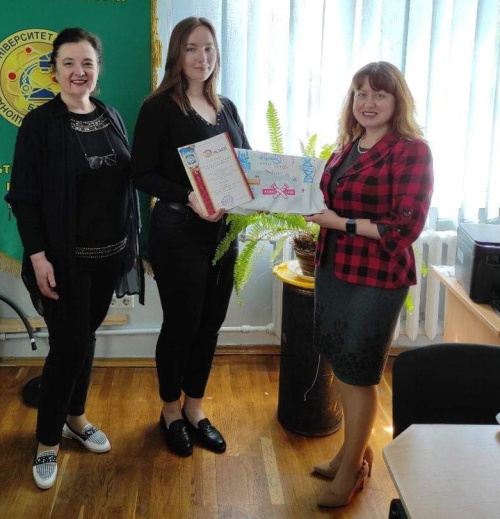
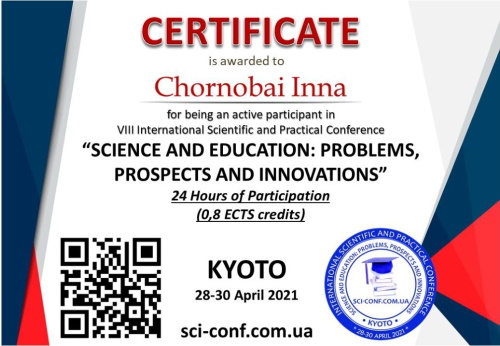
Young scientists are involved in research on solving problems of biofilm formation and biofouling, cell interactions within microbial communities, development of new environmental and pharmaceutical biotechnologies. Within the current issues of biomonitoring, the research of biological monitoring of ultra-low geomagnetic field oscillations for the collection and analysis of geomagnetic disturbances in the magnetosphere and changes in luminescence intensity by Photobacterium phosphorus is carried out. Students study the processes of regulation of viral cell interactions in natural and synthetic low molecular weight compounds.
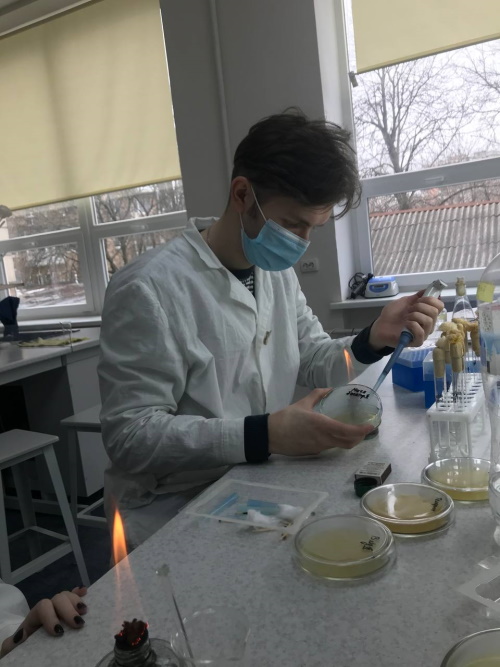
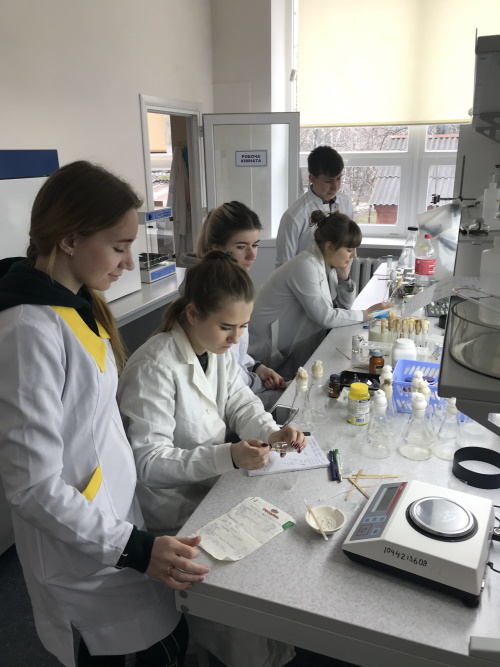
Since 2020, the students of the Department have been involved in the young scientists project “Development of a complex preparation of combined action based on collagen derivatives for the treatment of wound surfaces”, which is funded from the state budget.
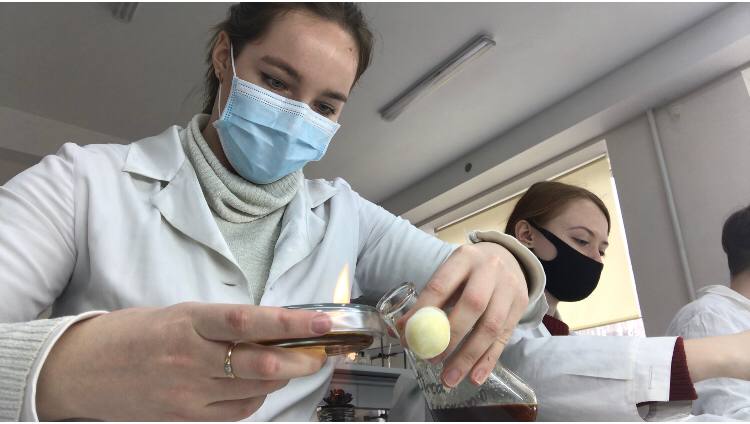
The graduate is suitable for independent employment at enterprises, organizations, and institutions with a biotechnological profile; control, diagnostic, forensic, environmental laboratories; authorities of sanitary and hygienic control, customs, departments for consumer protection; research institutes of the National Academy of Sciences of Ukraine; as well as in public institutions at the level of the Ministry of Education and Science of Ukraine, the Ministry of Health, the Ministry of Energy and Environmental Protection of Ukraine, relevant State Committees. Professional job titles: research engineer, laboratory engineer, technological engineer, standardization, and quality engineer; biologist-researcher, junior researcher; biotechnologist, assistant, state expert, product quality control inspector, biotechnology specialist.
Lifelong learning is provided to improve professional, scientific, and other activities. There is a possibility to continue training according to the educational and scientific program of the third (educational and scientific) level of higher education (Doctor of Philosophy), advanced training, retraining, and postgraduate education.
There is a postgraduate course with full-time and part-time forms of education. Upon completing the course with a thesis defense, the graduates are awarded the Doctor of Philosophy Degree in Specialty G15 – Light Industry Technology.
The Department maintains scientific and technical cooperation with foreign research organizations in Romania, Poland, Bulgaria, the Baltic States, Belgium, and Bangladesh.
Science is the basis for the successful development of every university. We promote:
Over the last 5 years, we have completed the projects:
